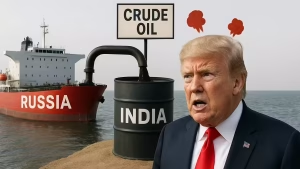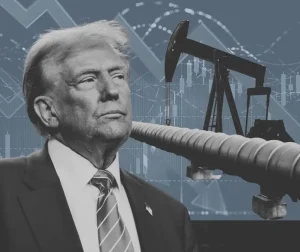Former Reserve Bank of India Governor Raghuram Rajan has issued a stark warning about the escalating trade tensions between India and the United States, specifically highlighting how the Raghuram Rajan Russian oil debate has become politically toxic. The renowned economist argues that forcing India to abandon its Russian oil purchases through tariff threats creates far more significant diplomatic and economic challenges than the immediate benefits might suggest.
In recent statements, Rajan criticised President Donald Trump’s approach of imposing a 50% tariff on Indian goods as leverage in trade negotiations. The Raghuram Rajan Russian oil perspective emphasises that this strategy resembles negotiating “with a gun to your head,” fundamentally undermining the foundation of fair bilateral trade discussions between the two democratic nations.

Also Read: Raghuram Rajan, Russian oil: Who is Raghuram Rajan?
For more Information: Press Briefing of August 7 2025
The core of the Raghuram Rajan Russian oil argument centres on political feasibility rather than economic necessity. While Rajan acknowledges that halting Russian oil imports “wouldn’t be a disaster” from a financial standpoint, he emphasises that the political optics of capitulating to American pressure present insurmountable domestic challenges for the Indian government.
The Raghuram Rajan Russian oil analysis reveals how Trump’s public linking of tariff threats to energy import decisions has made compliance politically untenable. By transforming what could have been a private diplomatic negotiation into a public confrontation, the United States has inadvertently strengthened domestic resistance to policy changes that might otherwise have been feasible.
This political dimension of the Raghuram Rajan Russian oil debate underscores the complexity of international trade negotiations in democratic societies. Governments must balance external pressures with domestic political realities, especially when sovereignty and economic independence are perceived to be at stake.
The Raghuram Rajan Russian oil controversy sits within a broader context of deteriorating US-India trade relations. Rajan warns that the current tariff structure threatens to render much of India’s $80 billion in exports to the United States economically unviable, while simultaneously damaging $40 billion worth of American exports to India.
These figures illustrate why the Raghuram Rajan Russian oil discussion extends beyond energy policy into fundamental questions about trade reciprocity. Rajan notes that while India maintains steep tariffs in certain sectors, both nations have legitimate grievances. American exporters face significant barriers in Indian markets, while Indian farmers compete against heavily subsidised American agriculture without equivalent social safety nets.
The Raghuram Rajan Russian oil framework suggests that sustainable solutions require acknowledging these mutual challenges rather than pursuing unilateral pressure tactics. The former central banker emphasises that effective negotiations demand patience and recognition of each party’s constraints, not ultimatums backed by economic coercion.
From a broader market perspective, the Raghuram Rajan Russian oil debate highlights critical global energy dynamics. Industry sources indicate that if India were to immediately cease Russian oil purchases, global crude prices would experience significant upward pressure. This reality demonstrates why the Raghuram Rajan Russian oil analysis emphasises viewing energy imports through strategic rather than purely political lenses.
The Raghuram Rajan Russian oil perspective acknowledges that India’s energy security depends on diversified supply sources. Sudden disruptions to established supply chains could create vulnerabilities that extend beyond immediate price impacts, affecting long-term economic stability and growth prospects.
The Raghuram Rajan Russian oil warning extends to potential shifts in regional geopolitical alignments. Rajan suggests that aggressive American pressure tactics risk pushing India closer to alternative partnerships, including with China. This possibility represents one of the most significant strategic risks embedded in the current approach.
The Raghuram Rajan Russian oil analysis indicates that diplomatic heavy-handedness often produces outcomes opposite to intended results. Rather than strengthening Western alignment, tariff threats may encourage non-aligned nations to explore alternative economic and security arrangements that reduce dependence on Western markets and institutions.
Despite his criticism of current tactics, Raghuram Rajan’s Russian oil framework offers constructive alternatives. Rajan suggests that India should consider strategic trade-offs, including reducing automotive tariffs while pushing for expanded service exports to the United States. This approach acknowledges legitimate American concerns while protecting Indian interests in sectors like agriculture.


Looking beyond immediate trade disputes, Rajan warns that tariff volatility poses greater long-term risks than tariff levels themselves. The uncertainty created by unpredictable trade policies disrupts investment planning and supply chain development, ultimately harming economic growth in both nations.
The Raghuram Rajan Russian oil perspective suggests that stability and predictability in trade relationships serve both countries’ interests better than short-term tactical victories achieved through economic coercion. This insight applies not only to energy imports but to the entire framework of US-India economic cooperation.
As global trade relationships continue evolving, the Raghuram Rajan Russian oil debate serves as a crucial case study in the challenges of maintaining strategic partnerships while navigating complex domestic political pressures and global economic realities.

